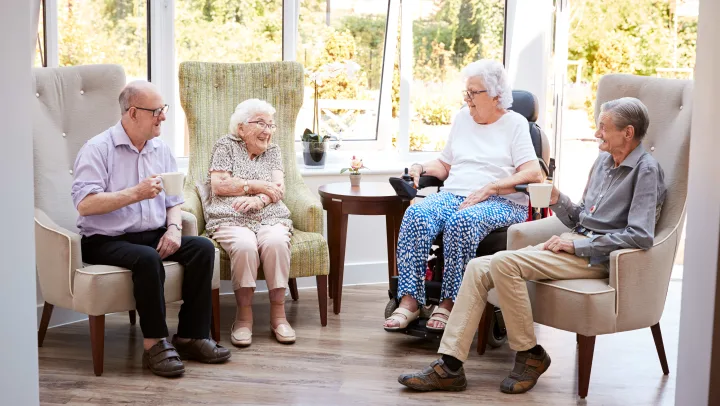Learn about customized Assisted Living services for elderly residents.
Learn about customized Assisted Living services for elderly residents.
Blog Article
Discovering the Right Assisted Living Solution for Tailored Memory Treatment Programs
The process of choosing a suitable assisted living solution for customized memory treatment programs requires a nuanced understanding of private requirements, particularly as they connect to cognitive impairments such as Alzheimer's and mental deterioration. It is critical to evaluate not only the credentials of the personnel yet also the schedule of personalized care plans that accommodate the certain challenges residents deal with. Moreover, the effect of appealing tasks and a supportive neighborhood can not be overstated. As we discover these aspects, the concern remains: what truly comprises an optimum setting for memory care?
Recognizing Memory Care Demands
Comprehending the unique memory care requirements of individuals with cognitive problems is important for supplying effective assistance and boosting quality of life. Cognitive disabilities, including Alzheimer's condition and other forms of dementia, considerably influence a person's capacity to process details, interact, and maintain freedom. Consequently, tailored strategies are vital in resolving these challenges.
People with memory disabilities commonly experience complication, state of mind variations, and disorientation, necessitating an encouraging and organized environment. Memory care programs must focus on creating a safe space that motivates social interaction, cognitive involvement, and psychological well-being. This can be achieved via specialized tasks, such as memory games, art therapy, and memory sessions, which promote cognitive excitement and protect individuality.

Examining Staff Qualifications
The credentials of personnel members in memory treatment programs are critical to supplying high-grade assistance for people with cognitive problems. Assessing personnel certifications includes evaluating both educational background and functional experience in senior citizen treatment, especially in memory-related conditions such as Alzheimer's and other forms of mental deterioration.
Search for staff that have relevant certifications, such as Licensed Dementia Specialist (CDP) or specialized training in memory care. These qualifications suggest a commitment to understanding the complexities of cognitive decline and effective interaction techniques customized to citizens' distinct demands. Furthermore, inquire concerning recurring training opportunities that personnel take part in, as continuous education and learning is vital in an area that evolves swiftly with new study and finest methods.
Additionally, examine the staff-to-resident proportion, as this directly influences the top quality of treatment. A lower proportion permits more customized interest and interaction with residents. Moreover, observe team interactions with existing residents to gauge their compassion, patience, and capability to connect. Eventually, a professional team is critical in cultivating an atmosphere that boosts the self-respect and lifestyle for individuals in memory treatment.
Relevance of Personalized Treatment Program
Personalized treatment plans play an important function in improving the health of individuals in memory treatment programs. These strategies are customized to the unique demands, choices, and capacities of each citizen, making certain that treatment is both relevant and efficient. By thinking about factors such as medical history, cognitive feature, and individual interests, caregivers can produce a comprehensive approach that promotes dignity and regard for every individual.
The significance of customized care plans expands past fundamental treatment needs; they foster a complacency and knowledge, which is crucial for individuals experiencing memory challenges. By addressing specific behavior patterns and emotional reactions, caregivers can execute methods that minimize anxiety and improve overall high quality of life.
Furthermore, customized care strategies help with far better communication among personnel, relative, and doctor. This collaborative technique makes sure that everybody included is notified and lined up in their care initiatives, leading to more constant and efficient support. Ultimately, a well-structured tailored care plan is vital in memory care programs, as it not just improves day-to-day living experiences however likewise contributes to the long-term health and wellness and happiness of homeowners.
Engaging Tasks and Programs

Tasks such as art treatment, songs sessions, and reminiscence therapy provide opportunities for self-expression and cognitive engagement. These deliberate interactions not only aid in maintaining cognitive abilities but additionally supply emotional advantages, minimizing sensations of isolation and anxiety that often come with memory loss.
Furthermore, organized team activities can motivate socialization, which is vital for psychological wellness - Assisted Living. Regular involvement in games, exercise classes, and area outings creates an ambience of friendship and assistance. Tailored programs that think about individual rate of interests and histories better boost interaction, making tasks a lot more significant and efficient
Integrating innovation, such as memory games and online reality experiences, can likewise offer to improve the day-to-day lives of citizens, offering ingenious ways to stimulate cognitive feature. Ultimately, a concentrate on engaging activities and programs is essential for fostering a helpful environment that promotes all natural wellness in memory care settings.

Assessing Area Environment
When reviewing an area setting for memory treatment programs, it is essential to think about factors that add to the overall health and security of residents. The physical design of the area should focus on ease of access and navigating, minimizing challenges while offering clear signage and acquainted sites. A protected environment is necessary to avoid locals from roaming, which can pose safety dangers.
Additionally, the sensory facets of the neighborhood, such as lighting, color design, and sound levels, play a considerable duty in enhancing comfort and decreasing anxiousness amongst citizens. All-natural light and exterior areas promote interaction with nature, cultivating a comforting atmosphere that can profit cognitive feature.
One more vital facet is the availability of qualified team who understand the one-of-a-kind requirements of individuals with memory impairments. Staff ought to be geared up to develop a caring atmosphere that motivates social interaction and emotional assistance.
Lastly, the feeling of community and belonging is important. Involving family involvement and chances for citizens to form links with peers can significantly enhance their general high quality of life. Assisted Living. By very carefully examining these factors, households can make educated choices regarding one of the most appropriate memory care neighborhood for their liked ones
Conclusion
To conclude, choosing a suitable assisted living remedy for customized memory care programs demands a discover this info here detailed examination of private requirements and choices. Focusing on personnel qualifications, customized care plans, engaging activities, and a helpful area atmosphere is essential for improving the lifestyle for locals dealing with cognitive obstacles. By addressing these important factors, households can ensure that their liked ones receive the necessary assistance and like foster emotional well-being and cognitive stimulation in a nurturing setting.
Report this page